We’ve burned down all the forests and are fighting to save the planet with paper straws and forks,” I saw written on many social media walls this summer.
I heard friends, acquaintances and strangers discussing as they sipped their frappe: “People are burning huge forests here, did the plastic straw really harm them?“. I saw how customers in a cafe asked for a “different”, correct, plastic straw for their coffee, and the employees took it out from under the counter and handed it over – others, of course, had it on the counter. Is this illegal? ( Spoiler: yes, illegal.) And I counted thousands of plastic straws all over the coasts and seas where I swam while on vacation.
Two conclusions follow from the above facts: that plastic straws are still available uncontrollably in Greece, despite a ban on their use for the past two years. And that there are still many people who have not understood the need for its abolition and the connection with environmental destruction and climate change – yes, the same one that leads to global warming, which, in turn, creates conditions for catastrophic fires and floods, impacts biodiversity and ultimately our health and survival.
Positive surprise
The use and disposal of plastic straws (as well as certain other single-use plastics such as plates, cutlery, cotton swabs, stirrers, Styrofoam cups) were banned in Greece by a law of October 2020 (Law 4736/2020), which included a directive EUwhich contains a number of provisions to reduce plastic pollution.
Greece became one of the first EU countries to include this directive, which was a positive factor. The law prohibited their placing on the market – and therefore their use by consumers – from July 2021 and included a provision that they could be sold until May 2022 in order to exhaust existing stocks. “This EU decision was not taken to make life difficult for Greek friend zoners, but because research and scientific measurements have shown that plastic straws are one of the most common types of litter found in the terrestrial and marine environment, causing a number of problems such as pollution, and threatening the health and survival of many marine species,” explains Achilleas Pletaras, Track Manager at WWF Hellas.
Experts estimate that there are currently about 150 million tons of plastic in the world’s seas. And while we continue to use it, another 27 thousand tons are added to this annually. Marine plastic pollution is mainly plastic and fishing gear that ends up in the seas, and accounts for 84% of total marine pollution (the rest is paper, wood, building materials, etc.). The Mediterranean Sea is particularly heavily polluted, into which approximately 570,000 tons of plastic are dumped annually (that is, 33,800 plastic bottles per minute over the course of a year).
86% of plastic in the sea is single-use plastic, a significant portion of which is straws. More specifically, 150 billion plastic straws are used annually in Europe alone, and the EU estimates that by 2030, 372 million will end up in European seas each year. Data from WWF’s Adopt A Beach project shows that plastic straws are the third most commonly found (7% of litter) on Greek beaches – and end up in Greek seas.
If we jump ahead a little, all these numbers look like this: in a few decades, we middle-aged and elderly people, along with our children and grandchildren, will be swimming, trying to reach the deep water or the beach, surrounded by thousands of small and larger plastic products. On the shore we will build plastic castles, and in a fish restaurant we will eat fish that have plastic in their stomach – one that we cannot see with the naked eye, but which ends up in our own body, in our organs, harming our health. By then, thousands of animal species, marine and non-marine, will suffer and die.
It is already estimated that every year a million birds and more than 100,000 marine mammals are killed either by becoming entangled in or ingesting plastic. Of course, microplastics have now been found in the human body, since they are already part of the food chain – they are ingested by animals, and we eat them, or they enter directly into our bodies through the plastic packaging that we use. Research has documented microplastics in various organs of the human body, and more recently in the blood. There are already estimates that its presence in our body is not beneficial, and further research is expected to determine exactly how and to what extent it affects our health.
Another way it affects the marine ecosystem is that “as marine animals and birds travel, they can carry invasive species or various pathogens—microorganisms that attach to them and can infect some marine species,” explains Mr. – Mr. Pletharas.
Of course, plastic pollution also has economic consequences, affecting economic sectors such as tourism, fishing and fish farming. It is expected that, in turn, the people employed in these industries and the local communities on which they depend for their livelihoods will be affected.
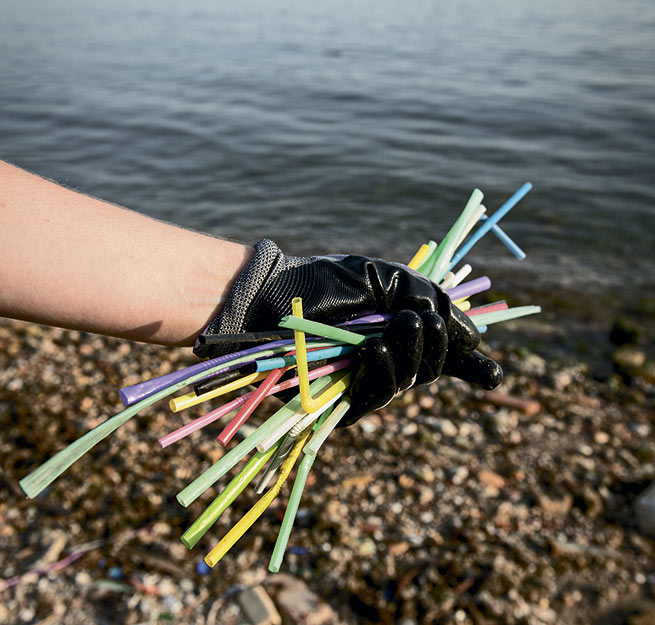
Data from WWF’s Adopt A Beach project shows that plastic straws are the third most commonly found item (7% of litter) on Greek beaches as well.
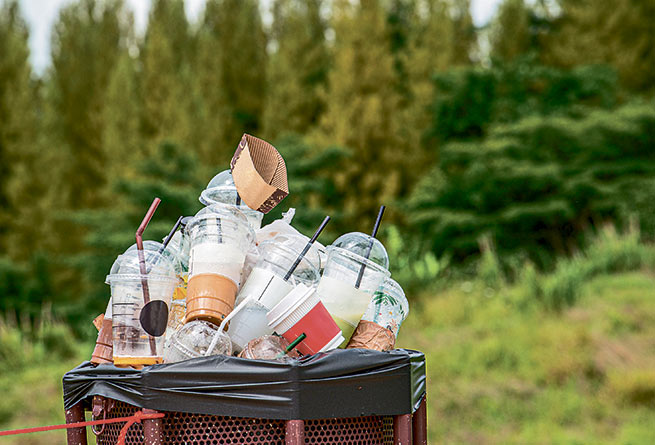
Photo by Vangelis Zavos
Straws and the climate crisis
When it comes to the connection between plastic straws and climate change and increasing carbon dioxide emissions, it is multi-faceted. First, using oil to make plastic complicates efforts to reduce fossil fuel production and transition to greener energy sources.
Secondly, their production process is more harmful to the environment in terms of pollutant emissions than the production process of, for example, paper. Third, the fact that plastic straws end up incinerated in landfills releases harmful gases and large amounts of carbon dioxide into the atmosphere (almost 400 million tons of carbon dioxide per year worldwide).
Another aspect of the problem that could be considered to get a full picture of the issue is that by uncontrollably disposing of straws into the terrestrial and marine environment or into the trash after their one-time short-lived use, the valuable natural resources used to create them are lost.
If you’re currently thinking that you can continue to use plastic straws (illegally) but make sure to recycle them to keep your environmental conscience at ease, then you’ll be disappointed to learn that plastic straws are generally not recycled because there are so many of them. difficult to separate when sorting and cleaning. For all these reasons, which should make us all reluctant to use plastic straws (and single-use plastic in general) without having to ban them, the EU and then the Greek state moved to abolish them. And there is encouraging data regarding the attitude of the population towards this decision.
Eurobarometer surveys found that 74% of citizens were concerned about the health impact and 87% about the environmental impact, and a YouGov survey a few years ago found that 77% of the public were in favor of banning plastic straws. In addition, legislators took into account that the abolition of straws does not have a negative impact on the well-being of citizens, and therefore could be an easy first step towards a more environmentally friendly everyday life for millions of citizens.
Under the counter
Almost three years after the EU decision and two years after the adoption of the Greek law, the situation is disappointing both in terms of the state’s ability to enforce laws and in terms of the personal responsibility of citizens. “After an initial period of widespread and strict enforcement of the ban on single-use plastic straws, they have gradually begun to reappear on the market. Their circulation is now an ‘open secret’, sometimes illegal (hidden under the counter in stores) and sometimes presented as ‘reusable’.” , explains Athena Kaldi, marketing director of Intertan SA, which sells paper straws in the Greek market through the Tessera brand. “They are obtained as a result of imports from countries that do not have such restrictions,” says Mr. Pletaras. “What we’ve learned about the companies we supply paper straws to is that coffee shops that are usually the most responsible are those that are part of the larger, branded chains,” explains Kaldi.
“It is very important to emphasize that while only single-use plastic straws are banned under this legislation, and therefore ‘reusable’ straws are exempt from the ban, the legislator has not provided a precise definition of when a product is considered single-use and when it is not.” As a result, two years later, the characteristics that make a product disposable and what can be excluded from that definition have still not been defined, leaving the window of opportunity for circumventing the law open today, she says. – For this reason, although Greek consumers initially complied with the law and switched to paper straws, resulting in their penetration of the Greek market reaching 100%, eventually the lack of control allowed sophisticated people to re-enter the market with plastic straws, which, being sold as “reusable” have even more plastic weight per unit to be considered washable! But the consumer, having picked up coffee with such a straw, presented as reusable, what will he do with it next? Will he take it home to use again, or will he throw it away on the street and on the beach?” she asks pointedly. And she ends with an alarming remark: “The worst thing is that in the absence of control and clear definition of disposable straws, the final piece weight of plastic straws circulating on the market illegally or ostensibly legally, has been increased to allow these products to pass the wash test, and so the amount and weight of plastic ending up in the seas is increasing rather than decreasing.”
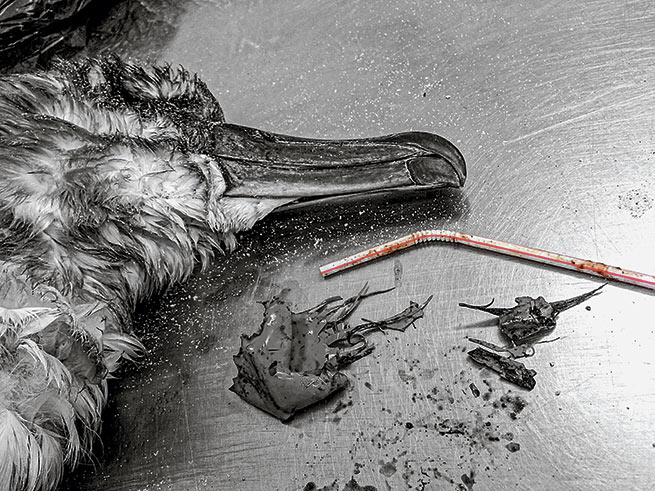
This poor seabird was found dead off the coast of Australia with pieces of a balloon and a plastic straw in its stomach. AP Photo
A small step for humanity
Although paper straws are just as likely to be thrown into the environment uncontrollably as plastic ones, they have the advantage that they disintegrate much more easily and quickly. Of course, recent research has shown that paper straws also contain chemicals that can be harmful to humans and the environment. In any case, the solution to the problem is not to go back to plastic straws.
“Even if all straws were abolished the day after tomorrow, it wouldn’t really be a problem for anyone. The only people who really need straws are some patients who can’t swallow, and there are provisions for them. Everyone else is exaggerating problem,” says Achilleas Pletharas. And yes, indeed, the planet will not be saved just because tomorrow everyone stops using plastic straws. But as WWF chief Hellas points out: “We have to start somewhere, don’t we? If we can’t start with the simplest things, how can we move on to other, more serious things, such as reducing other types of single-use plastic , better management of municipal waste, which today largely ends up uncontrolled in illegal landfills, and limiting greenhouse gas emissions?” And let’s be honest: is there really anything you can’t drink under any circumstances unless you have a plastic or other straw?

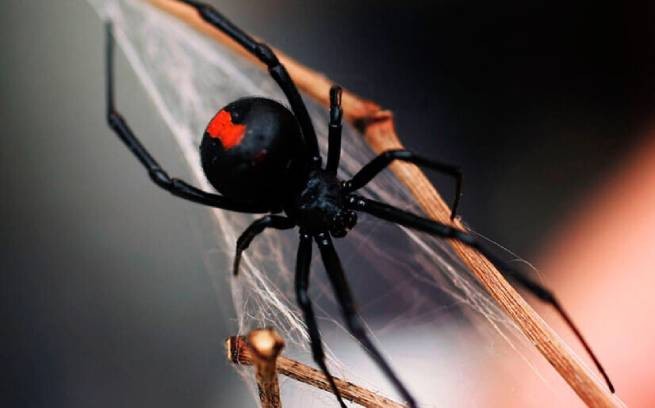



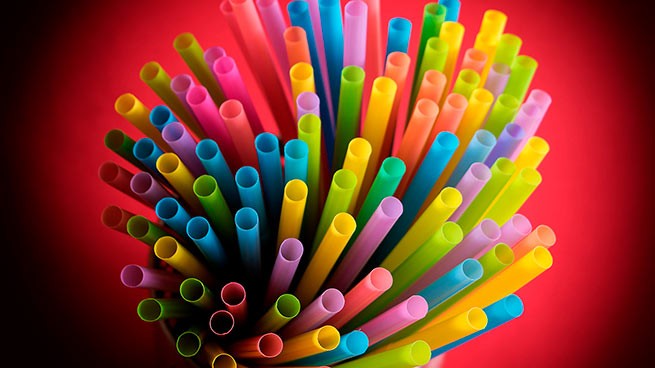

More Stories
Weather forecast: rain and storms in Athens and Thessaloniki on Saturday
Thodoris Kolidas explains the phenomenon "black sky" on Good Friday
Black swan in the Evros river delta